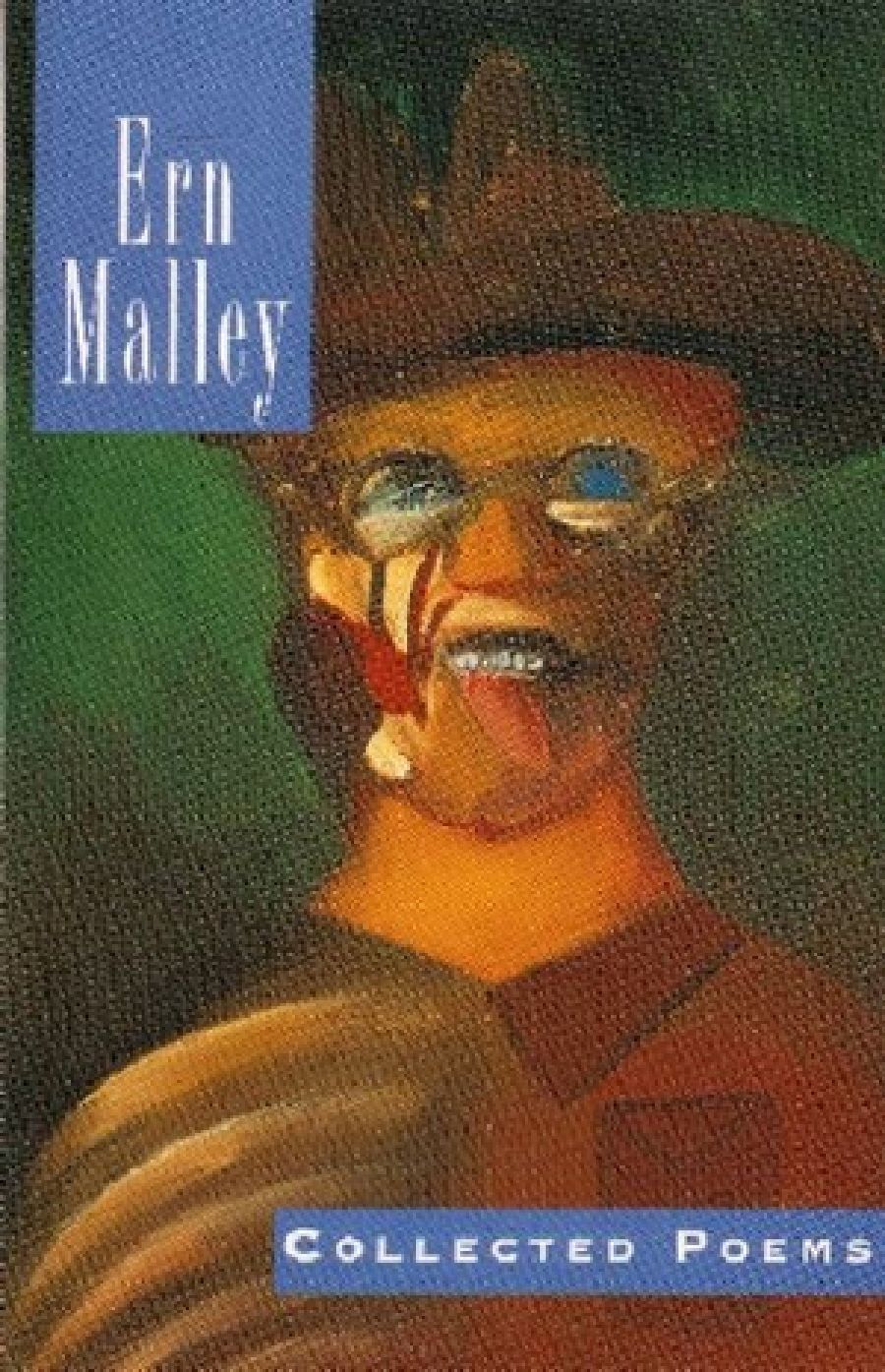
- Free Article: No
- Contents Category: Poetry
- Review Article: Yes
- Custom Highlight Text:
The poems of Ern Malley must be on the way to becoming the most reprinted collection of twentieth-century Australian poetry.
- Book 1 Title: Collected Poems
- Book 1 Biblio: A&R, $14.95 pb
We have been too long under the weight of the would-be literary establishment that endlessly reprints A.D. Hope and James McAuley and gives a patronising nod at Judith Wright and David Campbell. Tom Thompson has fossicked around to show that there were other energies active in the 1940s and though they do not add up to a movement as extended or intensive as the Heide group of artists (the Ern Malley affair kneecapped that) they illustrate at least an alternative way of looking that, in retrospect, seems almost poignant.
The idiosyncratic and the subversive, after 1944, went underground. In the case of that notable non-establishment poet, John Blight, this meant adopting the protective colouration of the sonnet form. In the case of John Manifold, who could out-formalise McAuley with both eyes closed, it meant the effrontery of realigning the bush ballad tradition. In the case of Francis Webb, it meant bringing onshore the American introvert cargo of Hart Crane and Robert Lowell.
As has often been pointed out, in co-authoring Ern Malley McAuley was attempting to exorcise his own response to modernism, well exemplified in his first volume, Under Alderbaran. Peter Coleman is the most recent reviewer to note this. After a couple of decades of wearing the tight underpants of formalism, McAuley himself discovered the later Lowell and released the remarkable late flowering of his own poetry, which redeems much. Harold Stewart moved from Orpheus to best-selling haiku in Japan, though his monumental verse epic By the Old Walls of Kyoto is most unlikely to reach the twelve editions in forty years that his release into Ern Malley has bestowed on his name.
It is curious that in a June edition of the Sunday Age, it is Harold Stewart who raises the intriguing question of copyright on the poems: ‘He said that though they had never sought to prevent publication, the copyright remained with himself and, since co-author James McAuley’s death in 1976, McAuley’s widow.’
It is well known that Max Harris received whatever small royalties have accrued from subsequent reprints, though it is worth noting that the 1974 edition of the Ern Malley poems published by R. Alistair McAlipine in London cites copyright of the poems as being by ‘Ern Malley’. I think there could be an intriguing legal case to support that claim.
If one wished to enter into legal hassles, however, I would hope that Max Harris, rather than offering ‘to recompense McAuley’s widow or Harold Stewart in lieu of royalties’ (as cited in the Sunday Age article) took out a law suit for substantial damages against those parties. It is certain their overt intention in fabricating the poems was to hoax, defraud, and damage Max Harris. They certainly effected real damage to that young man’s reputation and business credibility. It is only in the longer term that the costing of Harris’s liveliness, enterprise, and gullibility have been able to be measured. In that sense, the hoax for McAuley and Harold Stewart leaves them with the long-term scar. That, in the end, is largely what makes them still interesting.
It is curious that ‘Stewart said he believed the Angus & Robertson paperback was an attempt to “scuttle and sink” the Heyward account’. In view of the fact that the complete Ern Malley poems have been widely reprinted just last year in the Penguin Book of Modern Australian Poetry, such a claim is a nonsense. What the A&R edition offers are the astute Albert Tucker Introduction, Max Harris’s own classic account, and the important Colin Wilson essay which incorporates the Max Harris and John Reed editorial, ‘The Cultural Stream’.
Alongside Michael Heyward’s book, a ‘definitive’ account which re-examines the whole affair, this neat little volume reactivates our interest in the poems which, after all, have always been only the pretext for larger constructions, deconstructions, and deviations.


Comments powered by CComment